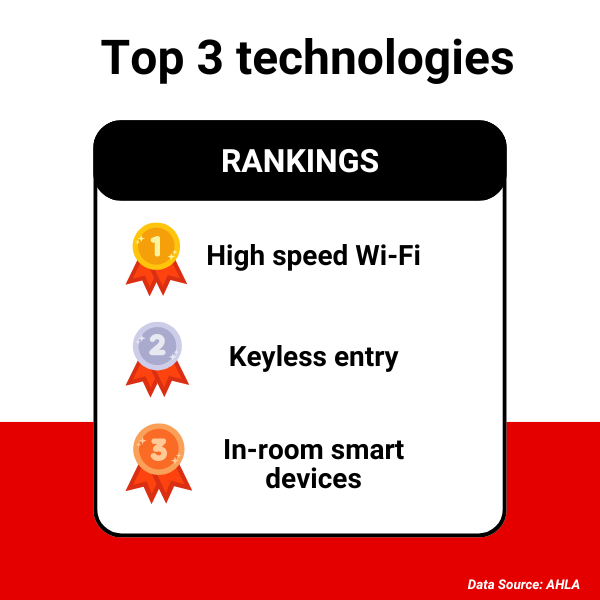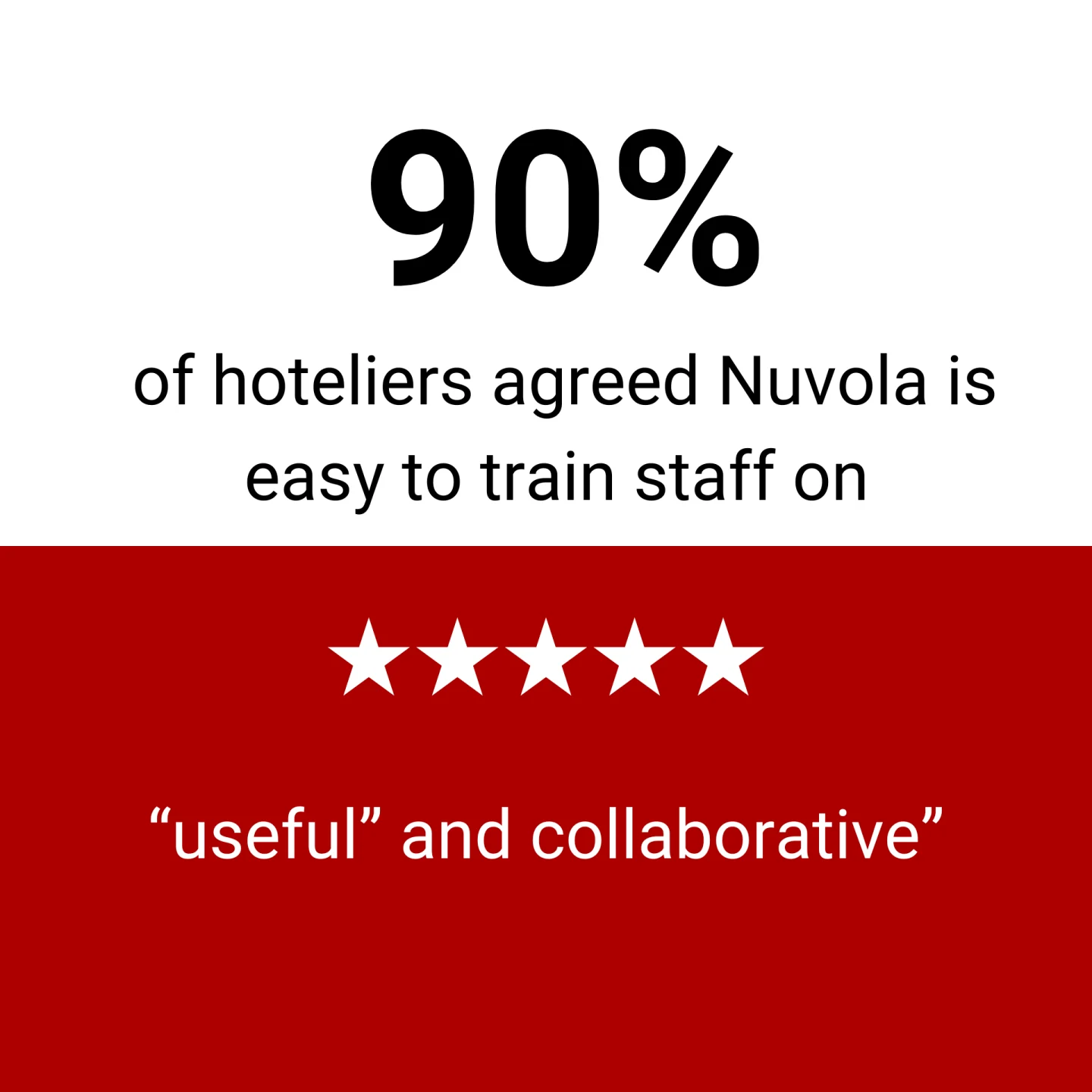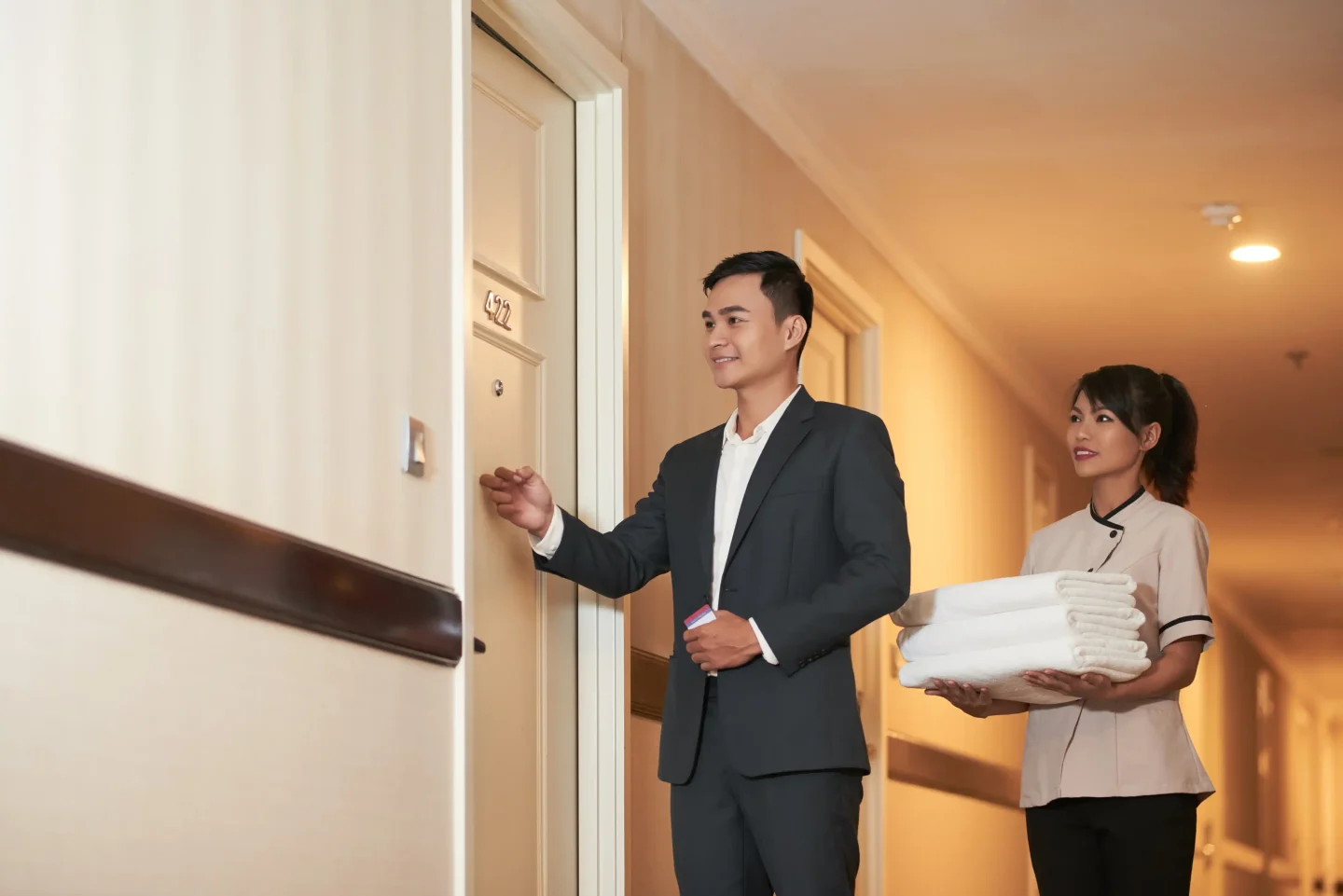Key Takeaways
- Use modern hotel technology that is intuitive and integrates with your other systems
- Prioritize guest experiences by anticipating needs and responding quickly using a task management solution
- Make it easy for your staff to communicate between departments and with guests
Leverage Technology
Effective hotel operation management is crucial for ensuring guest satisfaction, operational efficiency, and profitability. Here are ten best practices for effective hotel operations management.

1. Prioritize Guest Experiences
Knowing your guest and anticipating guest needs is an essential aspect of hotel operations management. According to a study done in 2024 by AHLA, travelers prioritize high-speed Wi-Fi when choosing their preferred hotel. One way to prioritize guest experiences is to ensure any requests made during their stay are handled promptly. For example, if they request an extra pillow be delivered to the room, you want to be confident the request is completed in a timely manner. Using a task management solution, like Sabre’s Nuvola solution, gives you confidence that guest requests get assigned to the correct team and give you live tracking to see if the request is in progress or has been completed yet. Another way to improve your guest experiences is to regularly review customer reviews to see if there is any common feedback that can easily be addressed like property cleanliness and friendliness of the front desk staff.
2. Select a task management system with PMS integration
To optimize on-property operations, hoteliers should select a task management solution with two-way integration with their PMS. A Property Management System, or PMS, is a tool that streamlines hotel operations by automating and centralizing essential processes such as check-ins and check-outs, room allocations, billing, and inventory management. When your task management tool and PMS are integrated it increases automation, reduces manual errors, and increases the power of your task management.
Hoteliers can select a PMS by carefully evaluating their specific needs and the capabilities of various systems. Hoteliers should consider factors such as user-friendliness, scalability, customer support, and the ability to provide real-time updates. Additionally, seeking feedback from industry peers who have used the system can provide valuable insights.
Nuvola offers two-way integration with many of the top PMS systems including Opera, SMS Host, Maestro, Infor HMS, StayNTouch, SynXis Property Hub, and more. Leveraging the PMS integration means you can use Nuvola’s Housekeeping module to manage room assignments for daily cleans based on guest preferences and labor productivity. Plus, you have real-time data at the front desk to know when a room cleaning finishes and you can assign it to a guest at check-in.
3. Focus on Sustainability
Sustainability is getting a lot of buzz nowadays, but with good merit. Many guests are interested in staying at eco-friendly hotels. If you aren’t already, you may want to consider focusing more on sustainability; while it’s certainly good for the environment, it can also help you reduce costs.
Hotels typically consume an average of 1,500 liters of water per room each day. To mitigate this high usage, hotels can adopt various eco-friendly practices such as encouraging guests to use their towels for multiple days and discontinuing daily linen changes. For instance, some hotels incentivize guests to skip daily linen changes by offering vouchers for food and beverage on-property. This not only preserves water but also reduces work your housekeeping team needs to do.
Another aspect of sustainability is ensuring your property’s machinery lives an optimal lifespan by scheduling preventative maintenance checks. This means checking on everything from your elevators and refrigerators, to AC units and lightbulbs. Invest in better light bulbs that use less energy and have longer life spans. Do preventative maintenance on the AC units to ensure they are cooling efficiently and effectively. By regularly checking-on and maintaining your machinery you also reduce the risk of something breaking when you haven’t budgeted for it.

4. Simplify Staff Training
Select technology that is user-friendly, so new team members can get trained on it quickly and your staff actually likes to use the software. Ensure your team is equipped with the skills and knowledge to provide excellent service and handle operations effectively.
When rolling out new software, ensure you dedicate the time needed to training your team on the new tool. Regular training sessions, workshops, and opportunities for professional growth can boost staff competence and morale, leading to improved guest experiences and smoother operations.
5. Actively manage guest feedback
Actively collecting and analyzing guest feedback is crucial for maintaining high standards of service in the hospitality industry. By actively seeking input from guests, hoteliers can gain valuable insights into their operations, identify areas for improvement, and address issues promptly. Whether it’s through surveys, online reviews, or direct communication, guest feedback provides a direct line of communication between the business and its customers. By listening to guests, hoteliers can make improvements and ultimately build stronger customer relationships.
SynXis Property Hub is an excellent example of a tool that can effectively implement guest feedback. This easy-to-use, cloud-native property management solution is designed to support limited-service hotels with daily operations, ranging from reservation and folio management to accounting, housekeeping, and reporting. By powering front-desk operations, this intuitive solution allows employees to add specialized guest notes, update loyalty member profiles, and more. This ensures that guest preferences and feedback are seamlessly integrated into the hotel’s operations, enhancing the overall guest experience.

6. Streamline Staff Communication
Effective communication is vital for smooth hotel operations. Ensure that information flows freely and accurately between front-of-house and back-of-house teams as well as your day and night shifts. A task management system is a great way to ensure nothing gets missed, you have visibility that task X has been assigned to team member Y and is currently in progress.
This is where it’s smart to pick an integrated solution rather than selecting one solution for housekeeping and another solution for task management. When everything is integrated, leaders only have to go on place to see what’s happening on property and it’s even easier for the different teams to share pertinent information without needing to pick up a radio.
Nuvola also offers a virtual, manager on duty logbook called “Pass On” to make it easy to pass pertinent information to the next shift. You’ll never need to worry about your physical logbook getting lost again!
7. Make guest communication easier
Give your guests options on how they communicate with you during their stay. Many tech-savvy guests appreciate having the option to use their cell phone to message the front desk rather than calling on the telephone in the room or walking to the front desk. Hospitality Technology’s 2022 Customer Engagement Survey found “73% of study respondents embrace the use of mobile devices to make reservations and to interact with a hotel,” making a hotel guest messaging tool a valuable touchpoint for your property.
8. Focus on Staff Morale
Foster a positive work environment that values teamwork, communication, and recognition to boost employee morale and reduce turnover. According to Gallup, highly engaged teams show 23% more profitability than teams with poor collaboration skills.
Happy and motivated staff are more likely to deliver excellent service. Foster a positive work environment by recognizing and rewarding hard work, encouraging open communication, and providing support when needed. High staff morale can lead to lower turnover rates and a more cohesive team.
9. Prepare for incidents
In the dynamic hospitality industry, the ability to swiftly adapt to change and effectively manage incidents is crucial. It is essential to develop and regularly update crisis management plans to ensure efficient handling of emergencies. Train your staff to respond calmly and decisively to various situations, prioritizing guest safety and minimizing disruptions.
Nuvola empowers hoteliers to proactively manage guest incidents. The Glitch model gives you the visibility to track guest incidents, catching recurring incidents so you can proactively fix things. It makes it easy to track the compensation given whether that’s a room discount, F&B discount, or other compensation. You can also set up real-time escalation notifications for high-value issues so staff can resolve them quickly and ensure the guest leaves happy.
10. Leverage data
Understanding and anticipating the needs and areas of improvement for your hotel is vital to operational success.
Nuvola allows hoteliers to see real-time updates and errors. Hoteliers can use Nuvola to access tangible data that gives them insights into how their operations are performing. Understanding and anticipating the hotel operational needs through data analytics and feedback allows hoteliers to maximize their hotel performance. Nuvola offers a data visualization tool that empowers hoteliers with tangible insights into key hotel operations. Hotel staff can easily identify which tags are promptly resolved and which ones face delays. Additionally, hoteliers can quickly access ticket volume data by hour, day, week, and month to optimize staffing levels. The tool also allows analysis of top tickets by location, including guest rooms and other areas on the property. Reports and statistics generated by the tool are readily printable and shareable via email.
Take action: apply these steps to your hotel management
As a hotel manager, implementing these best practices can significantly enhance your operations and guest satisfaction.
- Start by assessing your current technology and identifying areas for improvement.
- Prioritize integrating systems like task management and PMS to streamline processes.
- Embrace sustainability initiatives to reduce costs and appeal to eco-conscious guests.
- Invest in staff training and morale to ensure high-quality service.
- Actively manage guest feedback and improve communication channels.
By taking these steps, you will create a more efficient, guest-focused, and profitable hotel operation.
Related Articles:
- How one idea changed the landscape of hotel operations
- 6 reasons why automating hotel operations is a game changer
- How to pick the right hotel guest chat tool for your property
- 5 Tips to Unlocking Hotel Excellence
Resources:
- PowerPoint Presentation (ahla.com)
- Outdated hotel technology
- Sabre Hospitality Archives – Skift
- Resource Center | AHLA
- Employee Engagement vs. Employee Satisfaction and Organizational Culture (gallup.com)
- The Power of Employee Satisfaction for Customer Success (aaronhall.com)
- What is property management system (PMS)? | Definition from TechTarget
- Water Stewardship
Written by Aariah Doggett
SynXis® Property Hub
Managing day-to-day operations with complex hotel property management systems (PMSs) can create inefficiencies and leave little time for what matters most—your guests. SynXis Property Hub helps you Go Beyond, driving efficiency and simplifying property management so your staff can focus on meaningful tasks and interactions.




